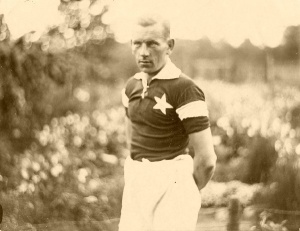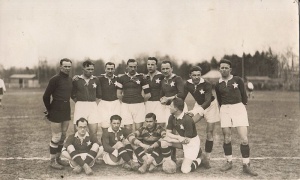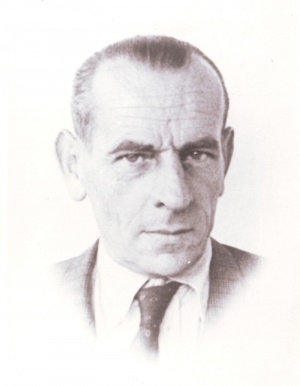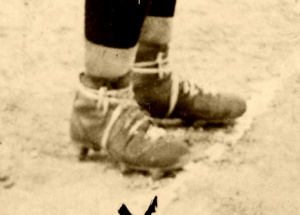Henryk Reyman (English)
Z Historia Wisły
Henryk Reyman (born July 28, 1897 – died April 11, 1963) was a legendary Polish football player and an iconic figure of Wisła Kraków. His contributions to Wisła, both on and off the field, were immense. Reyman joined Wisła in 1910 at the urging of his older cousins and quickly rose through the ranks. He made his debut for the first team in 1914, but his further career progression was halted by the outbreak of World War I.
In 1918, Reyman played a pivotal role in the reactivation of Wisła Kraków following the war. Five years later, in 1923, he was chosen as the captain of the team, a position he held until the end of his career. Under his leadership, Wisła achieved significant success, including winning the Polish Cup in 1926 and the Polish Championship in 1927 and 1928. Reyman himself was an exceptionally prolific striker, regarded as one of the best in the history of Polish football.
Reyman's dedication to the sport went hand in hand with his obligations as a professional officer in the Polish Army. He served in almost every war that Poland experienced during his lifetime. After serving in the Austro-Hungarian Army during World War I, Reyman joined the newly independent Polish Army and fought for the country's borders. While stationed in various parts of the country, such as Vilnius, he remained loyal to Wisła Kraków and never changed his club allegiance.
To attend his beloved club's matches, Reyman would travel for hours on trains, showcasing his remarkable devotion. His unwavering commitment earned him great admiration and respect from both teammates and fans. Reyman's love for football and his dedication to his club remained steadfast throughout his life.
Reyman excelled in the position of center forward in the 2-3-5 formation that was commonly used in the in Poland at the time. In this role, he could serve as the executioner of the team's offensive maneuvers, with the entire attacking formation working to create opportunities for him. Alternatively, Reyman could take charge of the offensive actions himself, orchestrating plays with the wingers and inside-forwards. Regardless of his specific role, Reyman consistently demonstrated exceptional skills on the field. Furthermore, he had an incredibly positive influence on the morale of the entire team. He commanded immense respect and his strong sense of duty and high expectations, primarily for himself, positively impacted all the other team members.
Henryk Reyman retired from football in 1933 and devoted himself to his military duties. Simultaneously, he became involved in football administration. He fought in the September Campaign of 1939, where he was injured and taken prisoner. Reyman managed to escape and due to being issued a death sentence in absentia by the Germans, went into hiding for the remainder of the occupation. After the war, he became one of the most prominent figures in Polish football. As the coach of the national team, he played a vital role in rebuilding Polish football in the post-war era.
However, as the communist regime strengthened its grip, Reyman faced increasing repression. He held negative views towards the new authorities, and they, in turn, treated him with hostility. When he was denied a passport for an international match involving the national team he was coaching, Reyman resigned from his position and withdrew from public life. It was only after the political thaw following Stalin's death that Reyman was able to re-engage with football. He returned as the national team coach and led Poland to the legendary victory over the Soviet Union in 1957, with a memorable score of 2-1.
Tragically, Henryk Reyman's life was cut short on April 11, 1963, when he passed away. His legacy, however, lives on as a symbol of Wisła Kraków and a revered figure in Polish football history. His exceptional skills, leadership and loyalty continue to inspire generations of football players and fans alike. Henryk Reyman's life was an extraordinary journey of dedication to football and unwavering patriotism. As a player, leader, and administrator, he left an indelible mark on Polish football. His skill, integrity, and unyielding commitment to his principles continue to inspire generations of players and fans. Reyman's legacy remains etched in the annals of Wisła Kraków and Polish football, forever remembered as a true symbol of the sport and an embodiment of unwavering loyalty to his beloved club. Wisła's stadium is named after him, so is a street adjacent to the arena.
See also
Reyman's boots
Legendary boots of Henryk Reyman. He took care of them in an exceptional manner, treating them as a talisman that brought him luck. He would inspect them before every match and maintain them after each game, not entirely trusting the team's dressing room attendants. He was well aware that good boots had a significant impact on the power and quality of his shots; shots that made the best goalkeepers in Poland and beyond tremble. It's no wonder he played in those boots continuously for 11 years and reluctantly reached for new ones.
In those boots, he scored the winning goal against Lviv's Sparta in the final minute of the Polish Cup final in 1926. In those boots, he outplayed the strongest Polish league teams, year after year, clinching the title of Polish champion and adding to those championships the accolades of the top scorer in the Polish league in 1927 and 1928.
In Poland, there were no players who did not regard Reyman with respect, both as a footballer and an officer in the Polish Army. Observing Reyman's boots, there is no doubt that they must have commanded respect among his opponents on the field. A clash with a foot clad in those boots was certainly no pleasure. It is worth noting that Reyman did not shy away from the tough, masculine battle on the field, utilizing every football accessory available to him.
Legendary quote
Those of you who do not feel capable of giving your all in the second half of the match to erase the shame that currently hangs over us, it would be better if you didn't step onto the field. No one expects you to win every time. Sometimes losing is part of the game. But everyone has the right to demand from you an ambitious and relentless fight. Do not allow people to consider you unworthy... of shaking hands.
With these words, Henryk Reyman addressed his teammates during the halftime of the derby match against Cracovia on May 3, 1925, with the score at 1-5 in favor of the opponents. In the second half, Wisła made a comeback, and the match ended in a 5-5 draw. Reyman himself scored four goals, despite being injured and having his leg in a cast just a few days earlier. These words continue to be an inspiration for players, officials, and fans of Wisła Kraków to this day. They have even become the club's motto, capturing the essence of sporting competition.




